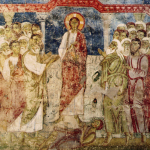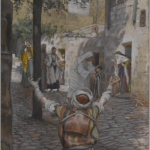Sexagesima and Quinquagesima
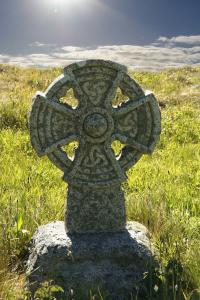
These are the names of the second and third Sundays in Shrovetide, which were on 4 and 11 February in 2024—in other words, the next-to-last and last Sundays before Lent, respectively. Rendered literally from the Latin, they mean “sixtieth” and “fiftieth.” Because Sundays are counted out for the forty days’ fast of Lent, the Sunday right before Ash Wednesday is fifty days before Easter. The names of Sexagesima and Seputagesima are derived by rounding the seven days of each preceding week up to a nice simple ten—as one often does, in the frequent practice of counting things by sevens.
Anyway, now that that more pressing a universal concern is out of the way, let’s get back into the Gospel for Year B! Mark is famous for being briskly paced, and it lives up to its reputation in these two readings. Jesus, having performed one of his first miracles, performs a whole bunch more in rapid succession. He also shows his first flash of odd, quick temper; we’ll get to that.
EDIT: I had originally been planning to combine these two Gospel readings (which are both short) into a single post, in the desperate hope of getting a little closer to where we actually are in Mark at this point. I don’t know how, but somehow, this post contrived to get itself published before I had finished it. I was then unable to figure out how to un-publish it in order to actually finish it. Increasingly exasperated, and unable to rectify the situation before I need to leave for Mass, I’ve settled for splitting the post in two, correcting the finished part that is already a published post (for the reading from Sexagesima), waiting to finish the rest, and being in a bad mood about it.
Mark 1.29-39, RSV-CE
And immediatelya he left the synagogue, and entered the house of Simon and Andrew, with James and John. Now Simon’s mother-in-law lay sick with a fever, and immediately they told him of her. And he came and took her by the hand and lifted her up, and the fever left her; and she served them.
That evening, at sundown,b they brought to him all who were sickc or possessed with demons.d And the whole city was gathered together about the door. And he healed many who were sick with various diseases,e and cast out many demons; and he would not permit the demons to speak, because they knew him.
And in the morning, a great while before day,f he rose and went out to a lonelyg place, and there he prayed. And Simon and those who were with him followedh him, and they found him and said to him, “Every one is searching for you.” And he said to them, “Let us go on to the next towns,i that I may preach there also; for that is why I came out.” And he went throughout all Galilee, preaching in their synagogues and casting out demons.
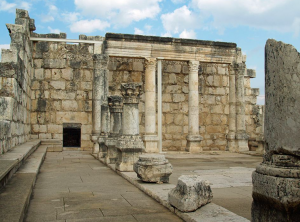
Remains of the fourth-century synagogue
at Capernaum. Photo by David Shankbone,
taken in 2007 and used under a CC BY-SA 3.0
license (source).
Mark 1.29-39, my translation
Going out of the synagogue, he went right awaya to the house of Simon and Andrew with Jacob and John. Simon’s mother-in-law was lying down with a fever, and right away they spoke to him about her. Coming to her, he raised her, holding her by the hand; and the fever released her, and she served them. When dusk came on and the sun sank,b they were carrying everyone to him who was doing badlyc and the demon-possessed,d and the whole city was assembled at the door. And he healed many who were doing badly with rashes or illnesses,e and cast out many demons (and he did not permit the demons to talk, because they knew him).
Now, getting up very first thing in the dark of the morning,f he went and got out to a desertedg place, where he prayed. Simon and those who were with him pursuedh him and found him, and said to him, “Everyone is searching for you.” And he said to them: “Let us go elsewhere, to the village holdings,i so that I may preach there too; I came out for this.” And he went preaching in their synagogues in the whole Galilee and casting out demons.
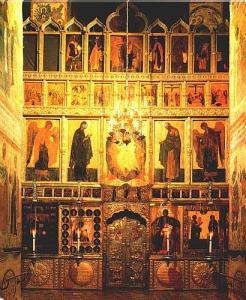
The ikonostasis in the Cathedral of the Annunciation
in Moscow. (An ikonostasis is a structural element
in Orthodox churches: it separates the nave, where
the congregants stand or sit, from the sanctuary proper,
where the altar is located.)
Textual Notes, vv. 29-39
a. immediately he left the synagogue/Going out of the synagogue, he went right away: Ah, εὐθύς,1 Mark’s favorite adverb: it means “immediately, directly, right away.” There’s a YouTuber I like who unluckily has a verbal tic which drives me crazy, and that verbal tic is that he says “whenever” every time he simply means “when”; this has actually inspired me to wonder whether Mark says εὐθύς whenever he simply means “then.” As for whether the adverb applies to how Jesus left the synagogue or how he progressed from there to Peter’s house (RSV takes it to be the former, while I’ve taken it to be the latter), I don’t know that either interpretation is less likely than the other, and obviously very little rides on the difference!
b. That evening, at sundown/When dusk came on and the sun sank: Mark here shows a surprisingly poetic turn of phrase, which I found charming and preferred to preserve.
c. sick/doing badly: “doing badly” is an almost comically literal translation of the Greek (“having badly” would be absolutely literal—have, like do and make, is one of those words whose uses in many languages tend to inflate and get oddly specific over time).
d. demons: This word is striking. Mark has already used a different term for this type of being; only a few verses ago he called it an “unclean spirit.” In Judaic usage, at this time, these two terms were synonyms. However, outside the sui generis monotheistic context of Judaism, a daimōn [δαίμων] in Greek was not generally thought of as a negative or hostile force. If anything, quite the contrary was true; the original sense of the word, centuries earlier, had been that of a tutelary spirit (not unlike the Christian belief in guardian angels), and in Plato’s Apologia, Socrates describes what is to all appearances his conscience as his daimōn. By this time, in most of the Greek-speaking world, it meant something like “demigod”; daimōnes were widely interpreted as intermediary spirits that aided humans’ attempts to appeal to the gods. I gather it was with the production of the Septuagint that daimōnes became more sinister in Semitic usage, as it then began to be used to translate the Hebrew word shed’yim [שֵׁדִים]—a term for the class of seemingly monstrous deities of the neighboring peoples, like Molech.
e. various diseases/rashes or illnesses: I decided to use “rashes” to translate poikilais [ποικίλαις], which I think must be the word the RSV chose to render as “various.” It literally means something like painted or speckled.2 I suppose “a smattering of diseases” might be the gist of the phrase, but to me, it more immediately suggested a rash or pockmarks.

Sunrise over the Sea of Galilee
f. in the morning, a great while before day/very first thing in the dark of the morning: The Greek here has a sequence of words that mean “in the morning,” “at night,” and “exceedingly.” I chose the translation I did because I feel it conveys something of the vividness of the original, but obviously nothing but tone hangs on this difference. (It is, however, rather striking that here at the beginning of Mark, right after Jesus’ first sermon and first miracle, we essentially get a repetition of “And there was evening, and there was morning.”)
g. lonely/deserted: The Greek here is the adjective erēmos [ἔρημος], which is the source of our eremitic and hermit; the word can describe either a place that is a wilderness or a place greatly isolated from people. As “deserted” hints at both, I decided to use that rather than “over-determine” the translation.
h. followed/pursued: The verb here is, strictly, the same one (or a derivative of the same on) used in other passages to talk about persecution. I therefore opted for pursued over followed, since the latter is neutral whereas the former can be strictly descriptive but carries connotations of enmity or “giving chase” to a quarry.
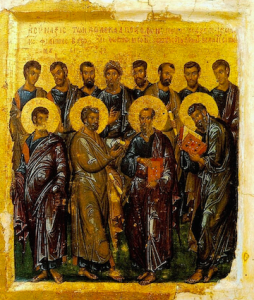
i. next towns/village holdings: “Village holdings” is a fairly literal translation. I gather this phrase indicates the district around a village that would be considered as “belonging to” it. Here again, the sense is little different between the RSV and mine.
1I don’t know why you would, but if you’re reading this aloud for some reason and want to know how to say εὐθύς, try this. Say “eh” (the vowel of egg), then “oo” (as in food), then “th” as in thing, then “ü” the German way, and lastly “s” as in this. Then run the first two vowels together (they’re a diphthong in Greek) and say the whole sequence in order, stressing the second syllable: eu-thüs. That’s pretty nearly it. (Also all the ancient Greeks are dead and the modern ones have their own pronunciation so who cares.)
2The Stoics were so named because they originally met in a colonnade north of the Athenian marketplace, called the Poikilē Stoa [Ποικίλη Στοά] or “Painted Portico.”


